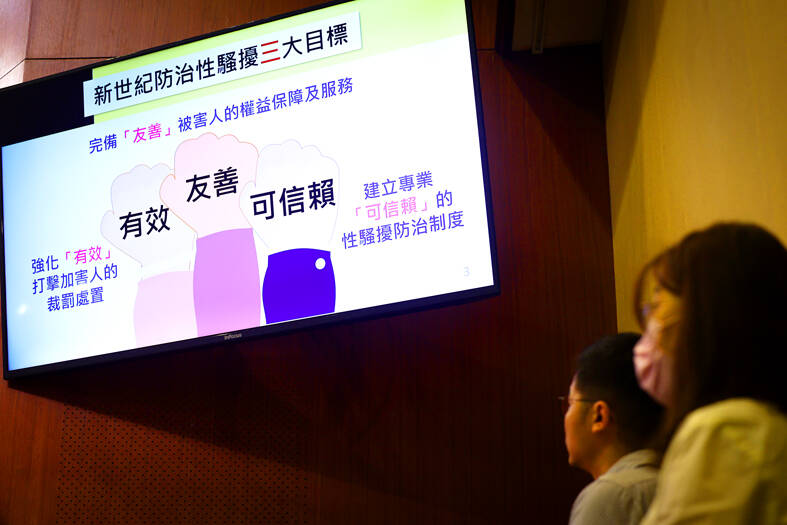The Executive Yuan yesterday approved amendments to gender equality laws that would impose stiffer penalties, including up to three years in prison and a maximum fine of NT$1 million (US$32,169) for offenders who use their position or power to sexually harass others.
The amendments to the Act of Gender Equality in Employment (性別平等工作法), the Gender Equity Education Act (性別平等教育法) and the Sexual Harassment Prevention Act (性騷擾防治法) were proposed following a series of harassment scandals that have been exposed since May, with perpetrators ranging from politicians to writers, academics and celebrities.
To facilitate their passage, the Legislative Yuan is to hold an extraordinary session starting next week, Executive Yuan officials said.

Reporters listen to the Executive Yuan announce amendments to gender equality laws at the Executive Yuan in Taipei yesterdat.
Photo: CNA
If the proposals are passed, about 10 supporting laws would still need to be in place before they can be fully implemented, the officials said.
The bills stipulate that the Gender Equity Education Act would apply in sexual harassment cases where students are involved, while the Act of Gender Equality in Employment would apply to the rest of the cases, said Minister Without Portfolio Lo Ping-cheng (羅秉成), who was in charge of coordinating government efforts to amend the laws.
The proposed amendment to the Gender Equity Education Act would close a loophole by including students in juvenile reformatory schools, and police and military academies, he said.
Penalties for sexual harassment by employers, government officials, school principals or people with authority would be stiffer than for general cases involving supervisors and workers, Lo said.
“Those who abuse their power to sexually harass others would not only face compensation lawsuits filed by victims, but they would be asked to pay for punitive damages as well,” he said. “The payment for punitive damages would be one to three times higher than the compensation granted to the victims if perpetrators fall under the general category. Offenders who are employers and school principals would have to pay three to five times the compensatory damage as penalty.”
Fines for perpetrators would be comprehensively increased through the amendments, Lo said.
The minimum administrative fine for general sexual harassment would be NT$10,000 to NT$200,000, he said.
Those who use their power to harass others would be fined between NT$60,000 and NT$600,000 under the general category, and between NT$10,000 and NT$1 million if the offenders are employers, Lo said.
They could also be jailed for up to three years, he added.
The amendments would allow sexual harassment victims to file complaints directly to gender equality officials in local governments if the offender is the employer or top representative of an organization, or victims are dissatisfied with the investigations conducted by employers, Lo said.
Local government officials should investigate sexual harassment complaints and issue punishments accordingly, he said.
Employers are obligated to report complaints of sexual harassment and their subsequent investigations to local gender equality officials, Lo said.
The statute of limitations for filing general sexual harassment complaints would be two years from the date a person reports the case and five years from when the incident occurred, he said.
In cases involving offenders who are employers or government officials, the statute of limitations would be three years from the date of the report and seven years from when it happened, Lo said.
If the sexual harassment occurred when the victim was a minor, the statute of limitations would be three years after they reach adulthood.
The government is not obligated to handle complaints of sexual harassment incidents that happened more than 10 years ago, he said.
The amendments would stipulate temporary measures to be taken when the top representative of an organization is involved in sexual harassment scandals, including suspending them from their duties or transferring them to a different position.
Source: Taipei Times - 2023/07/14




















